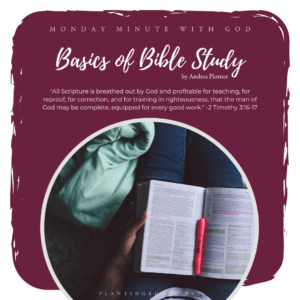In this week’s Monday Minute, Andrea shares with us five practical approaches to the basics of Bible Study. May our curiosity about the things of God never grow dim.

Basics of Bible Study…Be Curious!
by Andrea Plotner
Bible “Study” Involves Curiosity
Today we’re talking about the BASICS of Bible study. I want to differentiate Bible “study” from Bible “reading”. Though there are many fantastic Bible reading plans out there (my favorites being the multiple-chapters-a-day because big themes emerge), here we’ll assume Bible “study” goes a level or two deeper.
Bible “study” involves adding questions, answers, and curiosity to the mix.
The Value of God’s Word
The Bible is a treasure trove and you could mine its depths for a lifetime and never exhaust its riches. The Bible is also like a treasure map, and Jesus is the X that marks the spot. The whole Bible points to Christ, and as we study we discover more of Him and His love.
Listen to what Psalms, Hebrews, and Timothy say about the value of God’s Word:
At midnight I rise to give you thanks for your righteous laws. I am a friend to all who fear you, to all who follow your precepts. The earth is filled with your love, LORD; teach me your decrees. (Psalm 119:62-64 NIV)
For the word of God is alive and active. Sharper than any double-edged sword, it penetrates even to dividing soul and spirit, joints and marrow; it judges the thoughts and attitudes of the heart. (Hebrews 4:12 NIV)
All Scripture is God-breathed and is useful for teaching, rebuking, correcting and training in righteousness, so that the servant of God may be thoroughly equipped for every good work. (2 Timothy 3:16-17 NIV)
Getting Started
Because of the living and active nature of God and his Word, I like to enter into Bible study with a prayerful sense of expectancy. I expect to either learn something new about God or be reminded of a vital facet of his character in which I can grow.
Although there is no “right” amount of time, at least 15-20 minutes gives time to wrap your heart and mind around a passage. Have a Bible, pen, and notebook to capture your questions and answers. I also like to have a hot drink and a cozy chair. The treasure hunt is treasured time!
Where to Start
Where you start unearthing treasure is up to you, though starting at the first chapter of a Bible book lends context to the search. Studying one Psalm at a time (Psalms are generally shorter poems or songs) can be good training ground to hone your study skills.
So now you’ve opened up a book of the Bible and started to read. Let’s discuss a few different approaches below. Perhaps try them all at first.
The 5Ws & H Approach (The Journalistic Approach)
- Who? Are there hints as to who wrote the book and who is the intended audience?
- What? What do I learn about God in this passage? About his character? His activity?
- Where? Is a geographical area mentioned? Locales often have prophetic significance.
- When? Phrases such as “in the time of King Herod” give historical insight.
- How? The manner of happenings (“in the power of the Holy Spirit”) matters!
- Why? Key words such as “so that” and “which” can point to the author’s purpose in writing.
The “What Does It Say, Mean, Mean to Me?” Approach
One popular method asks three questions as you study: 1) What does the passage say? 2) What does the passage mean? 3) What does it mean to me? Record your answers on paper.
The Paraphrasing Approach
In school, my boys learned to write by hearing a fairy tale, rewriting it in outline form and then retelling the story in their own words working only from their outline. I’ve adopted a similar Bible study routine (a very basic form of homiletics). Using my notebook, I rewrite a Bible chapter in about ten sentences without missing any of the key details. It’s amazing how this exercise can cement a chapter in my brain and help me “meditate” on it even after I’ve walked away from my study time.
The Study-Bible Approach
One basic tool is a study Bible. After spending time interacting with a Bible passage on its own, a study Bible can provide explanatory notes and cross references. Explanatory notes are scholarly comments that often go beyond the obvious or provide more detail. Cross references lead you to other places in the Bible that relate to the passage at hand, without commentary. There are many different versions of study Bibles, so you might want to check out several before purchasing and/or ask a pastor or trusted friend what they recommend.
The Bible-Study-Group Approach
If studying the Bible on your own seems daunting, consider finding a study group through your local church, chapel, ministry, etc. Many installations have their own chapter of Protestant Women of the Chapel (PWOC). Bible study groups can shape the decision of what and how to study and allow a place to ask questions and glean from the discussion with others. You will get the most out of group Bible study when you arrive familiar with the passage and with any homework done.
Final Thoughts
Bible study is not just for “studious” people, just as treasure hunting isn’t just for pirates. We study the Bible to encounter the living God and learn of his wisdom and his ways. Over time (time I have never regretted), you’ll discover your preferred methods of asking questions, finding answers, and developing a curiosity that will help you grow in Christ and Christ-likeness.
Remember—X marks the spot!





